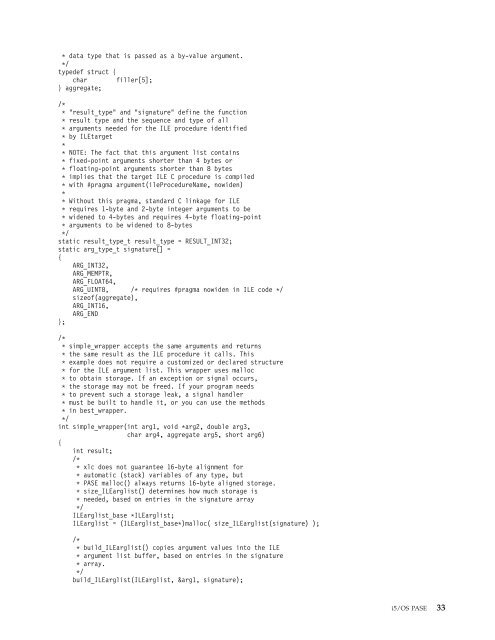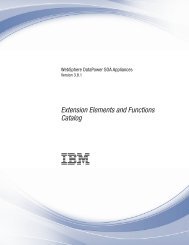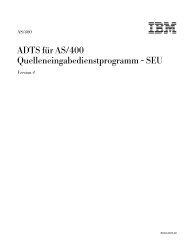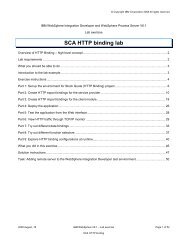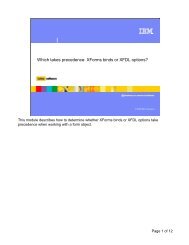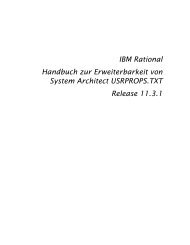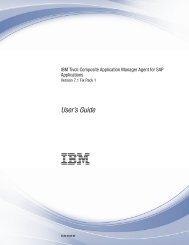System i: Programming i5/OS PASE - IBM
System i: Programming i5/OS PASE - IBM
System i: Programming i5/OS PASE - IBM
You also want an ePaper? Increase the reach of your titles
YUMPU automatically turns print PDFs into web optimized ePapers that Google loves.
* data type that is passed as a by-value argument.<br />
*/<br />
typedef struct {<br />
char filler[5];<br />
} aggregate;<br />
/*<br />
* "result_type" and "signature" define the function<br />
* result type and the sequence and type of all<br />
* arguments needed for the ILE procedure identified<br />
* by ILEtarget<br />
*<br />
* NOTE: The fact that this argument list contains<br />
* fixed-point arguments shorter than 4 bytes or<br />
* floating-point arguments shorter than 8 bytes<br />
* implies that the target ILE C procedure is compiled<br />
* with #pragma argument(ileProcedureName, nowiden)<br />
*<br />
* Without this pragma, standard C linkage for ILE<br />
* requires 1-byte and 2-byte integer arguments to be<br />
* widened to 4-bytes and requires 4-byte floating-point<br />
* arguments to be widened to 8-bytes<br />
*/<br />
static result_type_t result_type = RESULT_INT32;<br />
static arg_type_t signature[] =<br />
{<br />
ARG_INT32,<br />
ARG_MEMPTR,<br />
ARG_FLOAT64,<br />
ARG_UINT8, /* requires #pragma nowiden in ILE code */<br />
sizeof(aggregate),<br />
ARG_INT16,<br />
ARG_END<br />
};<br />
/*<br />
* simple_wrapper accepts the same arguments and returns<br />
* the same result as the ILE procedure it calls. This<br />
* example does not require a customized or declared structure<br />
* for the ILE argument list. This wrapper uses malloc<br />
* to obtain storage. If an exception or signal occurs,<br />
* the storage may not be freed. If your program needs<br />
* to prevent such a storage leak, a signal handler<br />
* must be built to handle it, or you can use the methods<br />
* in best_wrapper.<br />
*/<br />
int simple_wrapper(int arg1, void *arg2, double arg3,<br />
char arg4, aggregate arg5, short arg6)<br />
{<br />
int result;<br />
/*<br />
* xlc does not guarantee 16-byte alignment for<br />
* automatic (stack) variables of any type, but<br />
* <strong>PASE</strong> malloc() always returns 16-byte aligned storage.<br />
* size_ILEarglist() determines how much storage is<br />
* needed, based on entries in the signature array<br />
*/<br />
ILEarglist_base *ILEarglist;<br />
ILEarglist = (ILEarglist_base*)malloc( size_ILEarglist(signature) );<br />
/*<br />
* build_ILEarglist() copies argument values into the ILE<br />
* argument list buffer, based on entries in the signature<br />
* array.<br />
*/<br />
build_ILEarglist(ILEarglist, &arg1, signature);<br />
<strong>i5</strong>/<strong>OS</strong> <strong>PASE</strong> 33


